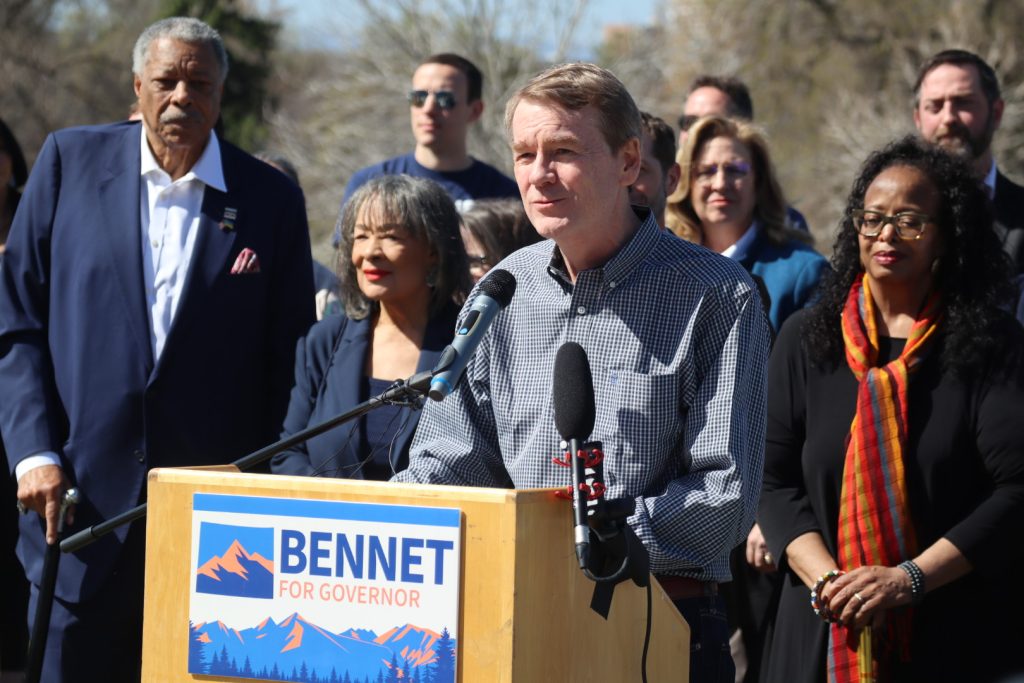One-on-one with Colorado Democratic Sen. Michael Bennet
The senator on the Trump White House, politics in Washington and the impacts of the ‘big, beautiful bill’ on Colorado

Courtesy Photo
During his third term representing Colorado at the United States Capitol, Democratic Sen. Michael Bennet said the two most prominent issues brought forward by constituents are the growing lack of affordability and worries about the political chaos in Washington, D.C.
The Aspen Times recently sat down with the senator to discuss the first seven months of the second Donald Trump presidency, delving into what he’s hearing from Coloradans, whether there’s anything positive for the state in the big, beautiful bill and how work in Congress is getting done during a period of extreme partisanship.
Rebuilding the American dream
“People are deeply worried about the ability to afford a home in the state,” Bennet said. “That’s been growing and growing over the last decade, but it’s reaching a crescendo as people are worried about what the future holds. And in the meantime, I’d say that they’re really worried about the dysfunction of Washington’s politics. I think they think that Donald Trump’s approach to his job is undermining the prospect of people here getting ahead economically.”
For Bennet, finding solutions to Colorado’s economic challenges — including addressing the affordability of housing, health care, childcare and more — is “all about rebuilding the American dream.”
“When you see the economic backdrop that elected Donald Trump, that’s a backdrop of too many Americans feeling like the American dream has become out of reach for them and out of reach for their family,” Bennet said. “And I don’t see us driving a stake through Trumpism without creating an economy that works a lot better for working people and allows us to build a middle class again in the United States and in Colorado.”
Bennet served in Congress during the first Trump administration, but he said the second term is different in one major way.
“The first time he ran and won, I don’t think Donald Trump was expecting to be elected president, and I don’t think he was prepared,” Bennet said. “This time, they spent four years preparing for the transition, and you can feel it.”
“They are implementing Project 2025,” Bennet added.
Project 2025 was published in 2023 by The Heritage Foundation, a conservative think tank, as a roadmap for a second Trump presidency. While Trump attempted to distance himself from the document during the 2024 election, several of its authors have earned positions in the administration, and some of the policies outlined in it have been reflected in executive and secretarial orders.
How the big, beautiful bill will hit Colorado
Earlier this year, much of the president’s agenda on immigration, energy and more was reflected in the domestic policy bill deemed Trump’s “big beautiful bill.”
While Republicans have touted the bill as one that provides tax relief, strengthens national security and curbs government spending, Bennet said “there really isn’t anything that could be good for Colorado.”
Top of the list of Bennet’s concerns is the cuts to Medicaid. The bill reduces Medicaid spending by around $1 trillion through 2034 by shifting costs to the state and changing eligibility. According to a White House memo, the goal is to improve the program “by eliminating waste, fraud, and abuse and blocking illegal immigrants from receiving Medicaid.”
Bennet said these cuts will be “substantial” and “hugely problematic” in Colorado. The state reports that 23% of the state’s population is enrolled in the health care program.
Bennet said the changes will be devastating not only to individuals who rely on Medicaid and to facilities — including rural hospitals, health centers and mental health providers — that people rely on for treatment, but to everyone.
“They’re throwing people off the Medicaid rolls, which means you get a whole bunch of people who are today insured through Medicaid, who then become uninsured and end up going to the emergency room to get their health care, which is the most expensive way for them to get health care,” Bennet said. “It jacks up the insurance rates for everybody else.”
The Medicaid cuts — paired with the looming expiration of federal tax credits passed in the Biden administration — have Colorado officials and lawmakers bracing for a jump in health care premiums.
Based on the initial plans submitted by insurance providers, 2026 premiums for individual health insurance offered through the state’s Connect for Health Colorado marketplace could increase by as much as 38% on the Western Slope. Colorado’s Division of Insurance has attributed the jump to the loss of the Affordable Care Act’s enhanced premium tax credits offered through the marketplace, which will expire at the end of 2025 without Congressional action.
Last week, Colorado state legislators returned to Denver for a special session seeking solutions to the $780 million budget shortage caused by the spending bill and to curb the expected spike in health care costs.
While the Congressional Democrats failed to lessen the blow to Medicaid within the federal spending bill, Bennett said they’re still trying to extend the tax credits.
Bennet said he has been having ongoing discussions with Republicans and Democrats on the topic. While Bennet was unsure whether there was any Republican support, the impact of not pushing the expiration past 2025 is clear to him.
“If the Republicans refuse to extend the Affordable Care Act tax credits, we’re going to see a massive spike in insurance prices just at the worst possible moment,” Bennet said. “It’s a double whammy that’s going to really hurt Colorado’s access to health care.”
U.S. Rep. Jeff Hurd, a Grand Junction Republican, confirmed through a spokesperson that he is working on legislation to “help alleviate the immediate removal of these vital tax credits, while still recognizing the long-term impacts of healthcare spending,” amid pressure from both Republican and Democratic Colorado lawmakers to address rising health care costs.

In addition to the bill’s impact on Colorado health care and budget, Bennet is concerned about how it gutted the Inflation Reduction Act’s climate tax credits. The Biden-era law created long-term tax credits for investments in clean energy manufacturing and infrastructure.
Bennet referred to the act’s climate provisions as “the most significant climate legislation that any government on planet Earth has passed,” adding that Republicans “decimated it.”
“If you think about the wind and solar tax credits — which I spent more than a decade of my life working on that had broad bipartisan support in Colorado and across the country — those were ripped out root and branch as part of this bill as well,” Bennet said. “That’s going to potentially have quite a negative effect on our wind and solar industry.”
Colorado has ambitious climate targets, including hitting net-zero emissions by 2050 and 100% clean electricity by 2040. Losing federal support for reaching these goals will require the state to step up and lead, but it’s something Colorado can’t wait to do, Bennet said.
“There is no state in America that is more exposed to climate change than Colorado,” Bennet said, listing the smoke, lengthening fire seasons, road closures and mudslides as climate-related impacts to local economies.
“You can see it outside today,” he added, referring to the smoke-filled skies in Vail as the Derby, Crosho and Lee fires all burned nearby. “We can’t afford not to get this right.”
Getting work done in Washington, D.C.
Bennet, who has served as a senator since 2009, said he’s seen Washington, D.C. politics become “much more of a tribal sport than it used to be.”
“There’s a lot of time spent on trying to prevent the other party from accomplishing anything and less time spent on trying to accomplish something,” Bennet said.
While increasingly difficult to get anything done that’s bipartisan, Bennet said there are a few recent examples of issues that garnered support from Congressional Republicans and Democrats.
This includes securing billions in funding for Ukraine in 2024, where “substantial bipartisan support” was the key to getting that across the finish line, Bennet said. Additionally, in August, all members of Colorado’s congressional delegation signed onto a letter requesting that the U.S. Department of the Interior unfreeze the $140 million in funding withheld from Colorado River projects in the state. (There has been no response or updates since the letter was sent, Bennet said.)
While Bennet noted that there were a few portions in Trump’s domestic policy bill that were met with negative bipartisan responses, none were more universal than the outcry over the public land sales proposed by Utah Republican Sen. Mike Lee. This could be beneficial in the future should these sales come back on the menu, which Bennet said is likely as long as Lee remains in the Senate.

Right now, with partisan politics dividing Congress and as a Democrat working against policies brought by the Republican-held Senate and the Trump White House, Bennet said that making progress comes down to two things: fighting and bearing witness.
“We have to not just hope — we have to fight to ensure that the craziness of Donald Trump’s approach really is a political aberration rather than a new way of doing business in our democracy,” Bennet said. “We just have to continue to push back to fight and to make sure that the American people know what’s going on.”
But a big part of the fight right now is knowing what to go to bat for.
“We also need to have a compelling vision of what the future is going to look like and what kind of future we want to build as Americans and as Coloradans,” he said. “I think that’s the most important part of the fight, to show that we are going to stand for something that looks very different from not just Donald Trump, but from Trumpism.”
Bennet believes that this fight will be held in the states rather than Washington, D.C.
“That’s one of the fundamental reasons that I decided to run for governor,” he said.
Bennet announced his bid for Colorado governor in April. Bennet will face state Attorney General Phil Weiser in the June 2026 Democratic primary. Former U.S. Rep. Greg Lopez, state Sen. Mark Baisley and Rep. Scott Bottoms, and Teller County Sheriff Jason Mikesell are among those seeking the Republican nomination in the primary. Over 30 individuals have filed as candidates for the November 2026 governor election with the Colorado secretary of state.

Support Local Journalism

Support Local Journalism
Readers around Glenwood Springs and Garfield County make the Post Independent’s work possible. Your financial contribution supports our efforts to deliver quality, locally relevant journalism.
Now more than ever, your support is critical to help us keep our community informed about the evolving coronavirus pandemic and the impact it is having locally. Every contribution, however large or small, will make a difference.
Each donation will be used exclusively for the development and creation of increased news coverage.










